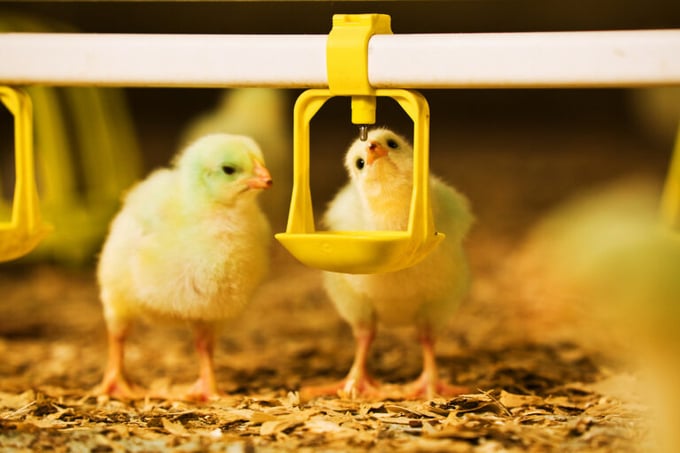May 30, 2025 | 10:13 GMT +7
May 30, 2025 | 10:13 GMT +7
Hotline: 0913.378.918
May 30, 2025 | 10:13 GMT +7
Hotline: 0913.378.918

Biosecurity is crucial in preventing avian influenza from entering a farm. Ensuring access to clean drinking water is a key part of these measures. Photos: Intracare.
Avian influenza is a virus that occurs naturally among wild aquatic birds. Infected birds can shed the virus in their nasal secretions, saliva and feces, which can infect domestic poultry species. This leads to severe consequences for animal health, welfare and production as well as great financial losses.
Biosecurity is crucial in preventing both highly pathogenic avian influenza and low pathogenic avian influenza from entering a farm. Strict hygiene measures apply to farmers, staff, and visitors. When highly pathogenic avian influenza is detected, immediate action is required to prevent its spread, including culling, surveillance, and quarantine.
The virus can survive for long periods on surfaces, requiring regular biosecurity reviews with veterinarians and farm staff. Effective biosecurity starts with identifying entry points, limiting movement of poultry and personnel, and thorough cleaning and disinfection.
The Intra Hygiene Programme offers the an effective cleaning and disinfection solution. As every farm situation can differ, contact your local distributor or Intracare for specific advice.
How does the bird flu spread?
The virus can enter the body through the eyes, nose, mouth, or by inhaling contaminated dust or droplets. Outbreaks of avian influenza often occur in the fall and winter when migratory birds, especially waterfowl, travel to Europe, Asia, and Africa. These birds can carry the virus without showing symptoms and spread it to others through saliva, nasal discharge, feathers, and feces.
Domesticated birds can become infected by avian influenza through several routes:

Essential biosecurity measures to protect your farm against the bird flu
It is essential to follow a strict biosecurity protocol to prevent avian influenza virus from entering the farm. This is a fundamental step in how to protect your birds from infection, ensuring that the right products are used at the right time. The following protocol details the necessary steps and products to ensure maximum biosecurity.
Steps in cleaning and disinfection:
(Poultryworld)

(VAN) The mutual export of agrifood products between the European Union (EU) and the United Kingdom (UK) must occur again without certification, border controls or other red tape. This was agreed at the UK-EU summit.
/2025/05/22/5121-2-173645_677.jpg)
(VAN) NBSAP Tracker identifies strengths and areas for improvement in the National Biodiversity Strategy, based on each region’s priorities and capacities.

(VAN) The draft amendment to the Circular on rice export trading stipulates a periodic reporting regime for rice exporting enterprises.

(VAN) Dong Thap farmers attained an average profit margin of 64% during the summer-autumn 2024 crop (first season), while An Giang and Kien Giang farmers followed with 56% and 54%, respectively.

(VAN) As a doctoral student doing research on renewable energy and electrification at Harvard University, the author shares his musings on electricity, nature, and countryside memories.

(VAN) The decree on Extended Producer Responsibility (EPR) ensures transparent management and disbursement of support funds, avoiding the creation of a “give-and-take” mechanism.

(VAN) Hue City rigorously enforces regulations regarding marine fishing and resource exploitation, with a particular emphasis on the monitoring of fishing vessels to prevent illegal, unreported, and unregulated (IUU) fishing.